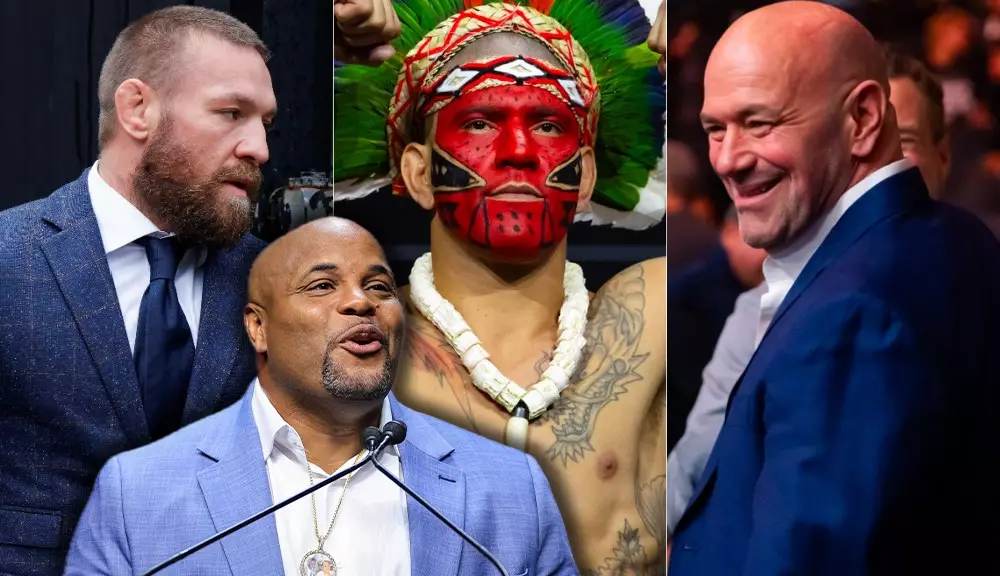Mixed Martial Arts (MMA) is a sport that has seen exponential growth in popularity and complexity over the years. As 2024 draws to a close, notable figures have shaped the industry in profound ways. UFC Hall of Famer Daniel Cormier, an influential commentator and two-time champion, recently shared his perspective on the key contributors who defined the landscape of MMA in 2024. His evaluations offer a compelling lens through which to explore the interconnectedness of fighter performance, promotional management, and marketability in this evolving sport.
At the forefront of Cormier’s analysis is Hunter Campbell, a pivotal figure in negotiations and athlete relations within the UFC. Campbell’s prominence in discussions indicates not only his significant role in promoting fighters but also his ability to build long-lasting relationships within the sport. Cormier highlights Campbell’s knack for smoothing over the complex negotiations that can often deter fighters from securing bouts.
In contrasting the past dynamics with today’s approach, it’s evident how Hunter Campbell revitalizes the negotiation process, thereby creating a nurturing environment for fighters. The seamless discussions and results foster a sense of trust and appreciation among athletes, compelling them to recognize Campbell’s contribution alongside that of the more famously recognized UFC President Dana White. This shift in focus from a singular figure to a more collaborative leadership model may redefine expectations within executive roles in sports.
No discussion of influential figures in 2024 would be complete without mentioning Conor McGregor. Even in his absence from the octagon, McGregor retains an unrivaled ability to capture attention and drive narratives in MMA. His recent struggles, from injuries to legal issues, only amplify his enigmatic presence in the sport. Cormier underscores how McGregor’s notoriety can influence not just fighters but also promotion strategies and media coverage.
McGregor’s impact transcends mere participation in fights; he has become the embodiment of the sport’s unpredictable nature. His every move—and non-move—creates ripples across various platforms, engaging fans and analysts alike. The anticipation that surrounds his potential return suggests that McGregor continues to play a crucial role in shaping the trajectory of MMA, serving as a reminder of how celebrity status can intertwine with athletic prowess.
As one of the most accomplished fighters in MMA history, Jon Jones remains a key figure this year. Cormier articulates an image of Jones navigating through the sport, showcasing his longevity and dominance. By headlining events and turning them into historical milestones, Jones continues to express his competitive spirit while influencing the direction of the heavyweight division.
Jones’s ability to control the narrative is compelling, as he manages to remain relevant even through the complexities of fight scheduling and negotiations. His recent victory over Stipe Miocic not only solidified his position but also underlined the shifting dynamics between different generations of fighters. This aspect is vital as it demonstrates Jones’s influence on both current and upcoming talents, providing a framework for what it means to sustain excellence in a continually evolving sport.
Alex Pereira’s emergence in the MMA scene has made waves, earning him a spot in Cormier’s influential rankings. Pereira’s ability to adapt, especially after a tough loss to a high-profile opponent, highlights resilience that many fighters may struggle to embody. His recent performances—most notably his spectacular finish against Khalil Rountree—demonstrate his dynamic fighting style and strategic acumen.
Not only is Pereira rising through the ranks, but he is also creating a narrative around himself that captivates fans. Cormier’s recognition of Pereira’s influence reflects the rising importance of character development and storytelling in MMA. As fighters like Pereira capitalize on their unique narratives, they redefine what it means to be a champion and how to engage audiences.
Concluding the list is the iconic Dana White, whose relentless pursuit of growth within the sport remains unparalleled. White’s leadership and strategic visions have been instrumental in the UFC’s expansion beyond traditional boundaries, thus attracting a broader audience. Cormier emphasizes the multifaceted approach White adopts—from negotiating major television deals to exploring markets like Saudi Arabia, he continually strives to elevate MMA.
As the sport prepares for pivotal future negotiations, White’s impact cannot be overstated. Cormier’s acknowledgment signifies a broader understanding of sports leadership, suggesting that effective presidents must adapt to changing environments to maintain relevance.
In synthesizing these perspectives, it’s clear that the landscape of MMA is shaped by a diverse array of individuals. From negotiators to prominent figures in the octagon, each plays a part in crafting the sport’s narrative, ensuring its vibrant and unpredictable evolution continues into the future.

